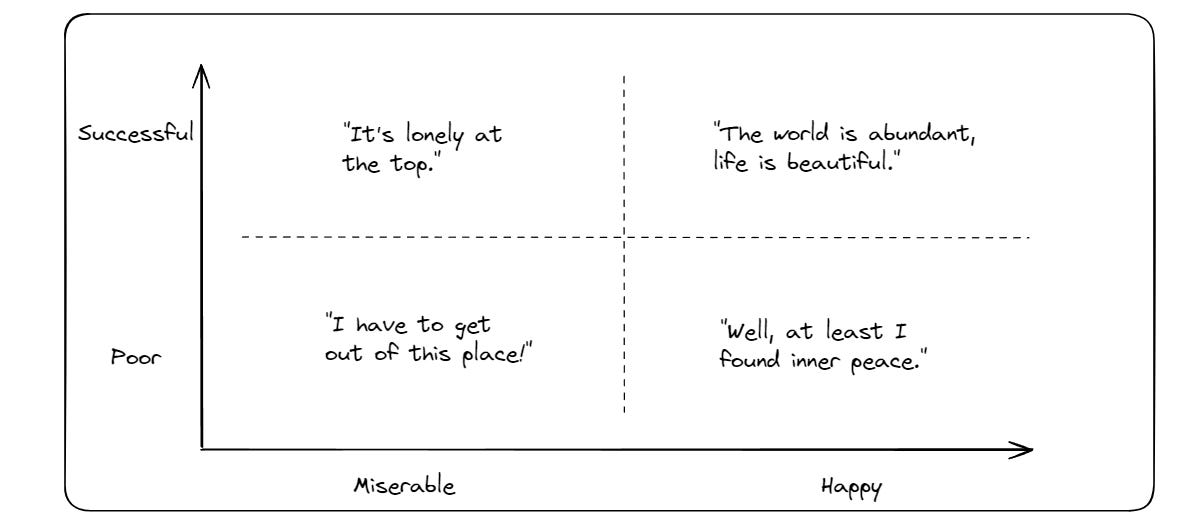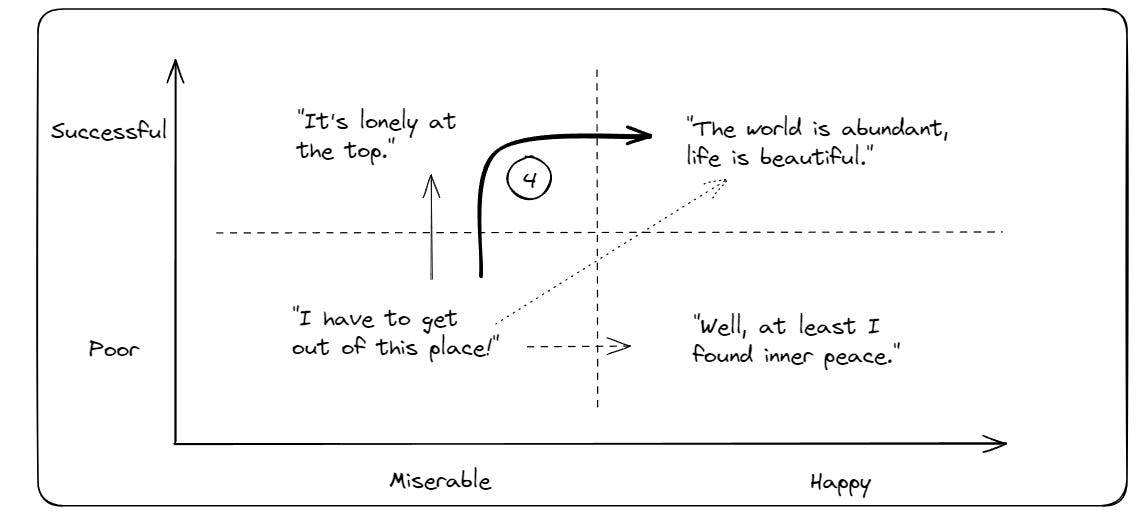My friend Tom Morgan once asked me why it was so hard to find role models in business and finance. The combination of success and a fulfilling and happy life appeared to be an outlier (Buffett or Ed Thorp come to mind). I think more of those people exist, but they are invisible. They prefer it that way.
Every so often, the media finds a new iteration of the ‘janitor dies with millions’ story. This past week, it was Geoffrey Holt who left a $3.8 million estate to his New Hampshire hometown. There had been no signs of his wealth: Holt lived in a mobile home, was riding a bicycle around town, and had given up on TV. He collected books, records, and model cars and trains. People said he mowed lawns to relax.
Is that how I would live with nearly $4 million in the bank? No. But that’s not the point. Holt had the freedom to do whatever he wanted. And it seems like he did. “He seemed to have what he wanted,” said his best friend and former employer, “but he didn’t want much.”
The marshmallow muscle
I’m sure you’ve heard of the Marshmallow Experiment in which children faced the choice of either eating one marshmallow immediately or two after waiting for some time. Researchers found that the children’s ability to delay gratification was an indicator of success later in life1. “Success usually comes down to choosing the pain of discipline over the ease of distraction,” James Clear commented. This is a powerful idea that can both free and entrap you.
Self-control is valuable and the average person would undoubtedly benefit from being more disciplined and patient. But what about the ones who are already pretty good at the game? If they’re ambitious, they study the stories of outsize success and find sacrifice, the cost of focus, written all over. Success, they learn, requires delaying gratification again and again...
Good grades now, dating later.
Career now, children later.
Grind now, relax later.
Save now, enjoy later.
When the mindset of delayed gratification starts taking over everything, the marshmallow test turns into a marshmallow trap. Life turns into a never-ending chain of opportunities to delay, to be patient, and to compound. All attention becomes focused on the future, the domain of Marshmallow Mind.
“The rule is, jam tomorrow and jam yesterday—but never jam today.”
“It must come sometimes to 'jam today,'” Alice objected.
“No, it can't,” said the queen. “It's jam every other day: today isn't any other day, you know.” Through the Looking-Glass
Rich, happy, neither, both?
Marshmallow Mind believes in a false dichotomy, that success and happiness are mutually exclusive, that they don’t exist in the same moment. Imagine four possible states:
Poor and miserable,
Poor and happy,
Successful and miserable, or
Successful and happy.
(I’m going to use poverty as shorthand for lack of success; I know it’s much more complicated than that.)
Poor and miserable: obviously, you don’t want to be here. There are three possible paths out:
Find happiness,
Become successful,
Both.
Path (1): Still poor but happy. It wouldn’t be my first choice, but it’s important to acknowledge that it is a choice.
Imagine if you were born into a place (or time) in which circumstances dictated you would live in poverty. There’s no food or energy surplus, no capital stock, no innovation, no productivity improvement, no growth, and no way to leave. You still have the option to cultivate a philosophy and mindset to find inner peace and happiness. As an alternative, consider fulfilling but poorly compensated professions in a wealthy society (monks, teachers, artists?).
Path (2): Successful but still miserable. You managed to escape poverty, but you’re not living a fulfilled life. We can observe this in others, yet it can be difficult to imagine it happening to us. No, it’s only those other people who can’t figure out how to be happy despite all that money. But just consider wealth and professional success accompanied by an absence of health, family, friends, and hobbies or other interests…
Path (3): Successful and happy. Jackpot. Obviously, this is the one you want to tap dance towards. But what happens when your mind is in Marshmallow mode?
The chains of a life deferred
Marshmallow Mind will tell you to first become successful, then be happy (as if you had to earn happiness). This is path number four:
As the Germans say: erst die Arbeit, dann das Vergnügen. Literally, work before pleasure.
So you do the work. You sacrifice. And because you’re sacrificing while others are out having fun, success becomes more and more important to your identity. You slowly forge the chains that can keep you up there, in that top left quadrant, in which you thought only other people could get stuck.
Tom touched on this in his excellent interview with life coach Devin Martin. Devin works with clients who sacrificed a lot and achieved remarkable success — only to become wealthy workaholics. They give up on life outside of work to focus on “making money or gaining respect” which leads to an “atrophying of hobbies, introspection, spirituality, physical health, personality, social connections and love.” In other words, the things that could make them happy waste away.
“Once they have the freedom they have been chasing,” Devin explained, “they have no idea what to do with it.” Another way of framing this is that these people covered the bottom layers of Maslow's hierarchy, physiological and safety needs. To progress further, they have to pivot. But that pivot to living a fulfilled life doesn’t happen. Marshmallow Mind has become too powerful. And Marshmallow Mind lives in the future.
Morgan Housel once wrote about what can happen if worry and anxiety are key ingredients to success. Stress becomes “ingrained in their identity” and people “can’t let go” once they’re successful. There is no exit ramp, just more work, more worry, and more delaying for the future because “they don’t know how to do anything else.” Sadly, this rings true for business, where ‘only the paranoid survive’, and markets, where your ability to manage risk is tested daily.
Marshmallow Mind tricks us into believing that the rewards for delayed gratification compound forever. They don’t. Eventually, they turn into a trap whose escape requires a radical break with our old identity. As Buffett put it, “the chains of habit are too light to be felt until they are too heavy to be broken.”
The invisible path
Most people have a different problem: they never figure out that patience is a superpower. Instant gratification leads them down a dangerous path towards the lower left quadrant. But the people who are very good at waiting, and I suspect this applies to many of my readers, run into this peculiar problem of over-developing the marshmallow muscle. It’s a peculiar problem because it comes with success. And once you’re successful, you’re not supposed to complain. So you’re left alone and wondering why things are the way they are even though you did everything right.
There is a middle path, but it is neither exciting nor profitable and therefore ‘has no advocate in the marketplace of attention. It will not be advertised or reinforced.’ Society would like you to pick one of the following two states:
Marshmallow failure: be a good consumer and spend your money on fleeting pleasure now.
Marshmallow trap: delay your life until retirement (if not later). Your productivity and savings make you the necessary and valuable complement to the consumer.
You need to keep both muscles active and alive: the one that leads to a prosperous future, and the one that allows you to embrace and appreciate the already abundant present.
There is a middle way, a path to prosperity and happiness. But its role models remain invisible. Granted, most of them don’t achieve the outsize success that attracts the world’s attention. But they aren’t interested in fame anyway. After all, they’re busy living their best lives.2
If life feels like a conveyor belt of ‘wait and eat more marshmallows later’-type situations, it’s time to get up and step away from the table for a moment. Remember, the whole marshmallow thing was just an experiment.
Thank you for reading,
Frederik
And of course there’s doubt whether a preschooler’s response to the test is actually predictive about their future. Does any social experiment still replicate?
Consider the story of Chuck Feeney who gave away his fortune quietly.









Great framing as always Frederick. The Marshmallow Trap is a great way of talking about this and immediately threw me into thinking of “Middle Way” approaches. Perhaps those are the advocates that aren’t strong enough attention grabbers -- Mahayana Buddhists and all that.
Enjoyable read, several great nuggets. I wanted to keep quote posting sections of your article but I didn't want to rob someone else the opportunity of uncovering unique insights for themselves!